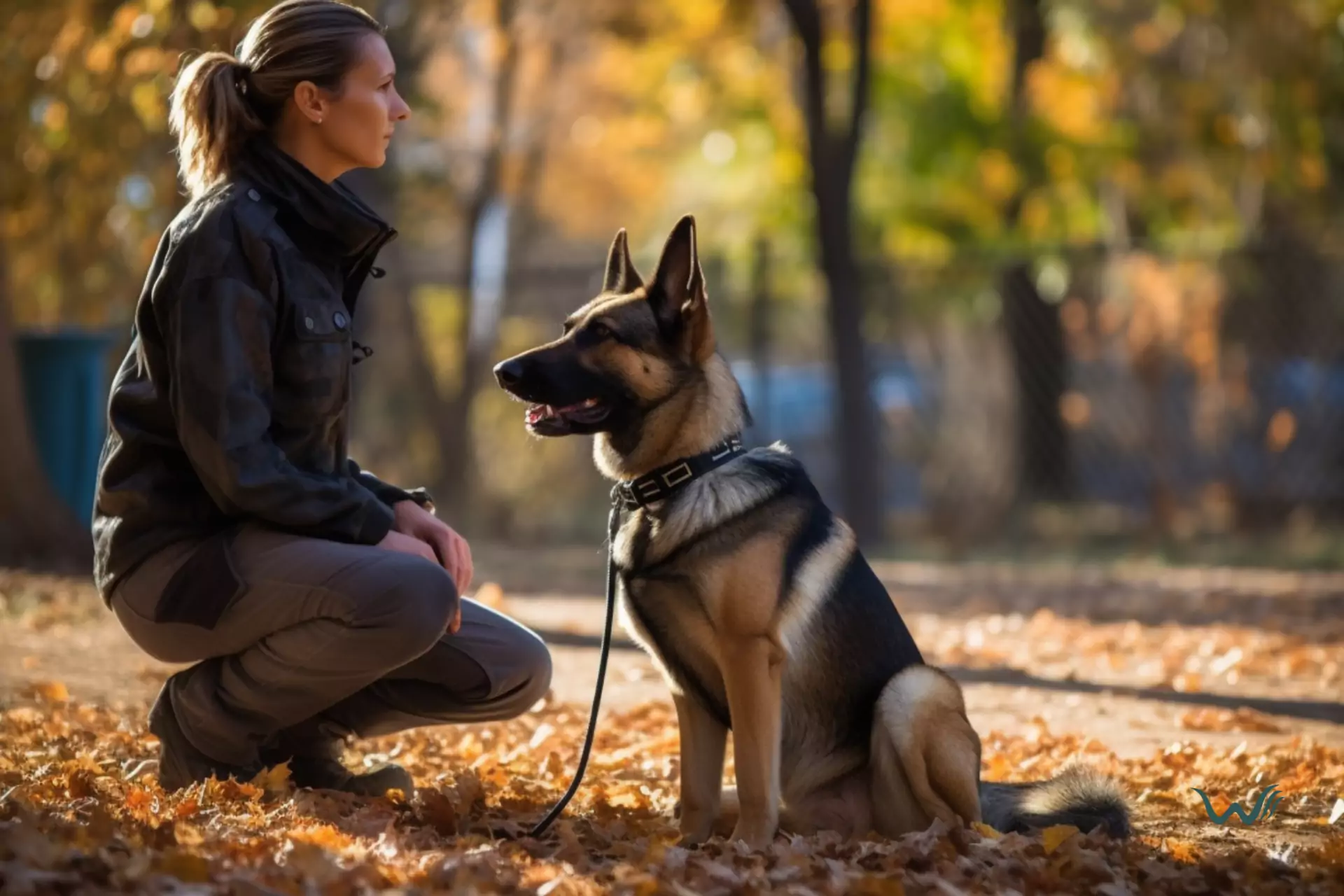

Why Do Dogs Bark When They Hear Noises Outside?
by Haley Mills
Last updated: April 22, 2024
Verified and Approved by:
Angela Morris,
MSW, LCSW
Fact Checked

Dogs have long been seen as man’s best friend, and their keen senses and instinctual behaviors have made them invaluable companions. One such behavior that has puzzled dog owners for centuries is their tendency to bark when they hear noises outside. This article will explore the scientific reasons behind this behavior, exploring the instinctual nature of dogs, their communication and alertness abilities, their sensitivity to sounds, and how their protective behavior is triggered.
Dogs are descendants of wolves, and their instinctual behaviors have been ingrained in their genetic makeup for thousands of years. Barking, as it turns out, is a form of communication for dogs. In the wild, wolves use vocalizations to communicate with their pack members and barking serves a similar purpose for domesticated dogs. When dogs hear noises outside, their instinctual nature kicks in, and they bark to alert their owners and other dogs in the vicinity of potential danger or intruders. This behavior is deeply rooted in their DNA and is their way of warning and protecting their pack, whether it be their human family or other dogs in the household.
The Instinctual Nature of Dogs
This behavior is rooted in their survival instincts, ingrained in them through years of evolution. In the wild, dogs are pack animals, relying on the strength and unity of their group to ensure their safety and survival. When they hear unfamiliar noises outside, they instinctively respond to alert the rest of the pack to potential threats. The survival instincts of dogs are closely tied to their pack mentality.
In a pack, each member has a role and responsibility to contribute to the overall well-being of the group. Dogs have evolved to be highly attuned to their surroundings and to be vigilant in detecting any signs of danger. When they hear noises outside, their instinct tells them that something or someone may be approaching their territory, and it is their duty to alert the rest of the pack.
Barking is a way for dogs to communicate and convey information to their pack members. By barking, they not only warn their owners of potential dangers, but also signal to other dogs in the area that there may be a threat nearby. This serves as a form of protection for the entire pack, as it increases the chances of detecting and deterring any potential intruders.
So, the next time your dog barks at a noise outside, remember that it is simply a manifestation of their instinctual nature and their commitment to keeping you and their pack safe.
Communication and Alertness
Upon hearing external sounds, canines instinctively communicate and raise awareness through barking. Dogs have incredibly acute hearing abilities, allowing them to detect sounds beyond the range of human perception. They can pick up on high-frequency noises and detect even the faintest sounds from a significant distance. This heightened sense of hearing enables dogs to be alert to their surroundings and detect potential environmental threats or changes.
When dogs hear noises outside, they use their barking to communicate. It signals to other dogs or their human companions that something is happening that requires attention. Dogs can differentiate between threatening and non-threatening noises. For example, they may bark loudly and aggressively in response to the sound of an intruder or a potential threat, while barking with excitement or curiosity in response to a non-threatening noise like a passing car or a neighbor walking by.
Sensitivity to Sounds
If you’re at home, chances are you’ll jump at least once when you hear a sudden loud noise, just like dogs, who, with their acute hearing, are startled by unexpected sounds. Dogs have a much higher hearing range than humans, with the ability to detect sounds at frequencies as high as 65,000 Hz, compared to the human range of 20,000 Hz. This heightened sense of hearing makes dogs more sensitive to sounds in their environment, and they are more likely to react to noises that may seem insignificant to us.
One reason dogs bark when they hear noises outside is their natural instinct to protect their territory and alert their owners of potential threats. Dogs have an innate sense of loyalty and are known for their ability to guard their homes and families. When they hear a noise outside, they may interpret it as a possible intruder or danger and instinctively bark to warn their owners. This behavior is prevalent in breeds known for their protective instincts, such as German Shepherds and Doberman Pinschers.
Another factor influencing a dog’s reaction to noises is noise phobia. Just like humans can have phobias to certain things, dogs can develop an intense fear or anxiety towards loud or sudden sounds. This can cause them to bark excessively or exhibit other signs of distress, such as hiding, trembling, or trying to escape. Noise phobia can occur in any breed, but certain breeds, such as Border Collies and Shetland Sheepdogs, are known to be more prone to developing this condition.
Protective Behavior
By instinct, you can’t help but feel a sense of protection when you hear unfamiliar sounds outside. Being highly sensitive to their surroundings, dogs also experience this fear response and territorial instinct. When they hear noises outside, they often react by barking as a way to communicate their presence and ward off potential threats.
Here are five reasons why dogs exhibit protective behavior through barking:
- Alerting the pack: Dogs are pack animals, and their barking serves as a means to alert their pack members, including their human family, about potential danger. They say, “Hey, something is not right here, and we need to be on guard.”
- Defending their territory: Dogs have a strong instinct to protect their territory, which includes their home and the surrounding area. Barking is a way for them to establish boundaries and deter intruders from entering their space.
- Expressing fear: Barking can also be a result of fear or anxiety. When dogs feel threatened or scared, they may bark to communicate their discomfort and attempt to intimidate the perceived threat.
- Warning other animals: Dogs have an excellent sense of hearing and can detect sounds that humans may not even notice. Their barking can warn other animals in the vicinity, alerting them to potential danger.
- Seeking reassurance: In some cases, dogs may bark simply because they’re seeking reassurance from their owners. By barking, they’re signaling that they know something unusual is happening and are looking for guidance and support.
Are Noises Outside and Strangers Both Triggers for Dog Barking?
Many dogs bark at noises outside and strangers. This behavior is Instinctual as dogs are territorial and protective of their home. They bark to alert their owners of potential threats and to establish boundaries. Understanding why dogs bark at strangers can help owners manage this behavior through training and socialization.
Training and Conditioning
Trainers often use conditioning techniques to help control a dog’s response to noises outside, creating a more peaceful environment. One commonly used technique is positive reinforcement, which involves rewarding the dog for calm behavior when they hear noises. For example, when a dog remains quiet and relaxed in response to a noise, they may be given a treat or praise.
Over time, the dog learns to associate the noise with positive outcomes, and their barking is reduced. Desensitization is another technique used in training dogs to be less reactive to outside noises. This involves gradually exposing the dog to the noise at a low volume and increasing it over time. The goal is to desensitize the dog to the noise so that it no longer triggers a strong reaction.
For example, a trainer may start by playing a recording of the noise at a very low volume and gradually increase the volume as the dog becomes more comfortable. Through this process, the dog learns to remain calm and quiet in the presence of the noise. By using positive reinforcement and desensitization techniques, trainers can help dogs develop a more controlled response to noises outside.
This creates a more peaceful environment for the dog and their owners and improves the dog’s overall well-being. It is important to note that training and conditioning techniques should always be done under a professional trainer’s guidance to ensure the process’s safety and effectiveness.
In Conclusion
Dogs bark when they hear noises outside due to their instinctual nature, communication and alertness, sensitivity to sounds, and protective behavior.
It is a deeply ingrained instinct for dogs to communicate and alert others of potential environmental threats or changes. Their acute sense of hearing allows them to detect even the faintest of sounds, and their natural protective instincts kick in when they perceive something as a potential danger. This protective behavior is deeply ingrained in their genetic makeup and has been honed through centuries of domestication and selective breeding.
As the saying goes, “A barking dog never bites,” and by paying attention to their barks, we can ensure the safety and well-being of our furry companions.
Certify Your Emotional Support Animal Today

Why You Can Rely on Us?
At Wellness Wag, we believe your pet deserves care rooted in both science and compassion. Each article is carefully researched, written in clear language for pet owners, and then reviewed by qualified professionals to ensure the information is evidence-based, current, and practical for real-life care. Our goal is to help you feel confident in making informed decisions about your pet’s health and well-being.
Reviewed by
Angela Morris, MSW, LCSW
Angela is a licensed clinical social worker with 20 years of experience in patient advocacy and community mental health. She has assisted numerous clients with ESA evaluations and brings a deep understanding of disability accommodations, ensuring that all information is accurate, supportive, and practical.

Written by :
Haley Mills
Last Updated :
April 22, 2024










